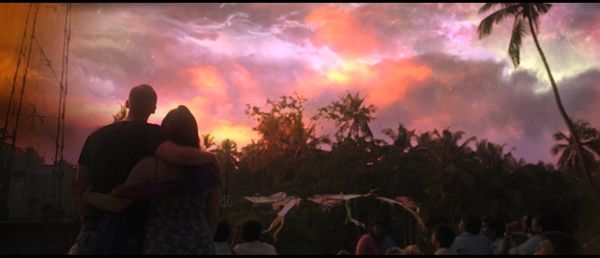Eye For Film >> Movies >> Pendulum (2017) Film Review
Pendulum
Reviewed by: Jennie Kermode

You've probably been asked the question at some point in your life: if the world was ending, what would you do with the time that you had left? It's a question that may resonate differently with the younger generation today. With children around the world striking in protest at inaction on climate change and teenage campaigner Greta Thunberg warning "There is simply not enough time to wait for us to grow up and become the ones in charge," it's evident that young people are beginning to take the prospect of finding themselves in this situation seriously - even to expect it. Lauren Cooney's short film posits a different kind of disaster but raises similar questions. What would become of a generation of young people growing up with the expectation that they would never have a chance to grow old?
Pendulum sets the scene at the outset with the sort of blunt exposition that's forgiveable in a short, where time is at a premium. It's delivered by Cerys (played by Cooney herself), a young woman who has grown up with hedonism as a response to her sense of hopelessness about the future. This isn't just youthful angst - a cosmic rip has been discovered travelling towards Earth, and though it has taken years to arrive there has never been any prospect of stopping it or otherwise escaping. Yet as the fateful day draws hear, Cerys and her best friend Gwylim (Scott Michael Wagstaff) begin to feel that there must be more to life than despair and distraction, so they travel to India, where some groups of people see the end of material existence as something to celebrate.

Inspired by Gareth Edwards' Monsters, this is a film that reaches for revelation. Perhaps stymied by the intensity of its own efforts, it falls short, but is still looks beautiful and still has something to say. These are not the first young people to go looking for enlightenment and Cooney is well aware that there are people out there ready to exploit them, as she is of the shortcomings of last-minute experiments with drugs, sex or borrowed rituals. As she tries to find herself and, by way of that, some way to come to terms with what's about to happen, Cerys also has to contend with other people trying to tell her who she really is or should be. The same poisonous behaviours that affect the rest of life can be found in the Indian retreat as the shortage of remaining time seems to make people more desperate for power over one another.
There's a strong idea here and it keeps things interesting despite the film's structural issues. The middle section of the film is too slow, suggesting a projection onto the viewer of ideas still in the director's head. We don't get a strong enough sense of place or character to develop the necessary emotional connection with what's happening. The film recovers its pace towards the end, however, when events force Cerys to make a genuine re-evaluation of her life and when the cosmic event finally makes itself fully visible.
The scope of Cooney's ambition here makes the film stand out. Although the CGI work at the end is a little rough, it effectively creates the sense of events so overwhelming that they make even personal survival feel like a small thing. With ever-improving access to good quality CGI tools, this is something we're starting to see a lot more of in independent work, but thus far is been used mostly for action and adventure. it's with filmmakers like Cooney turning it to narrative ends that things start to get interesting.
Reviewed on: 31 Mar 2019
















